人教版(2019)必修 第二册Unit 3 The internet同步讲义学案(无答案)
文档属性
| 名称 | 人教版(2019)必修 第二册Unit 3 The internet同步讲义学案(无答案) | 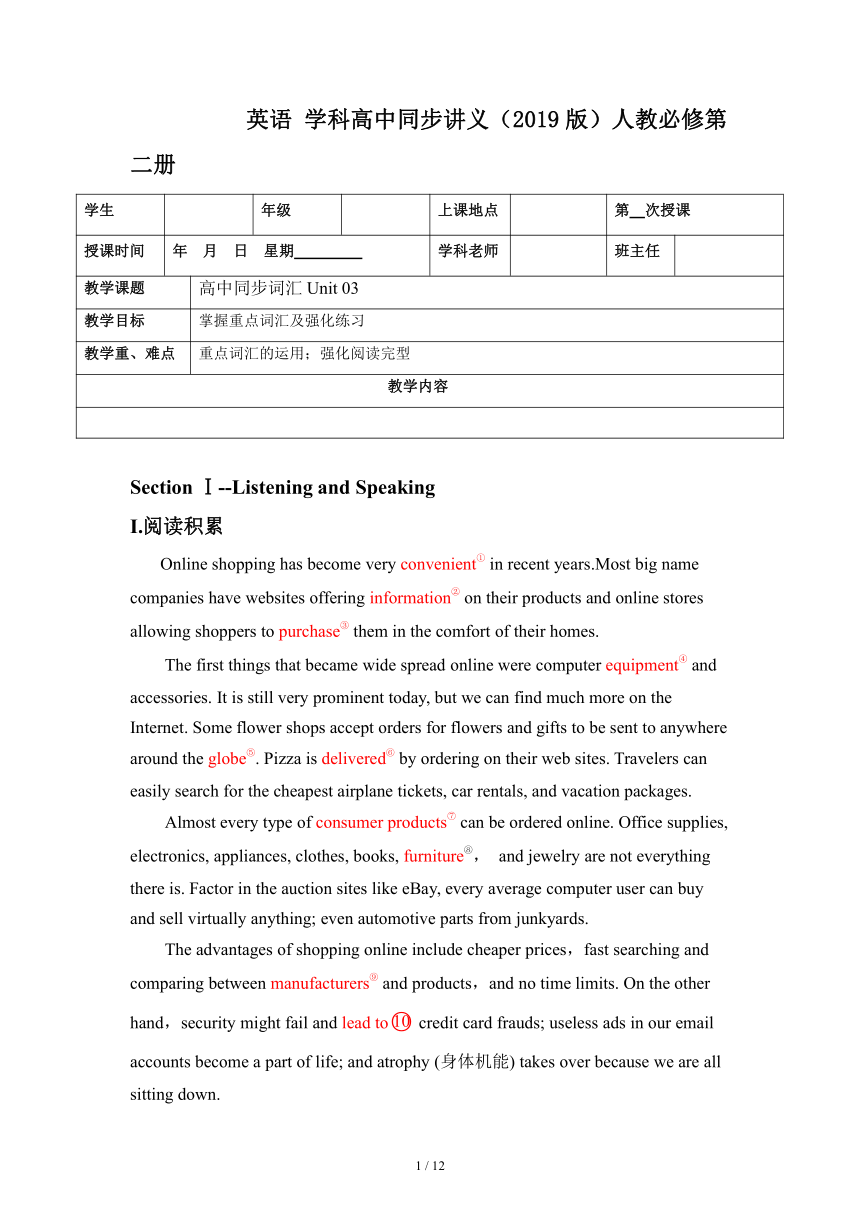 | |
| 格式 | zip | ||
| 文件大小 | 68.9KB | ||
| 资源类型 | 教案 | ||
| 版本资源 | 人教版(2019) | ||
| 科目 | 英语 | ||
| 更新时间 | 2022-01-21 11:28:34 | ||
图片预览

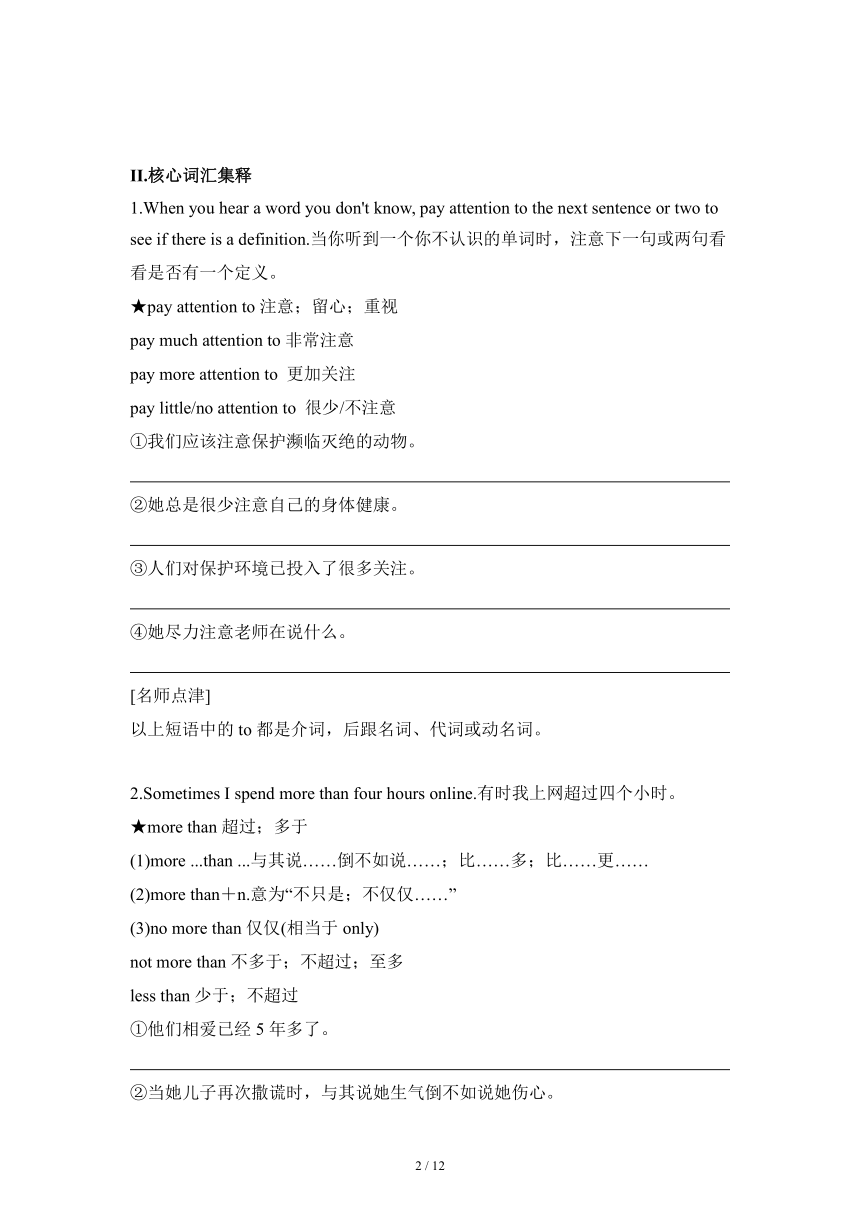
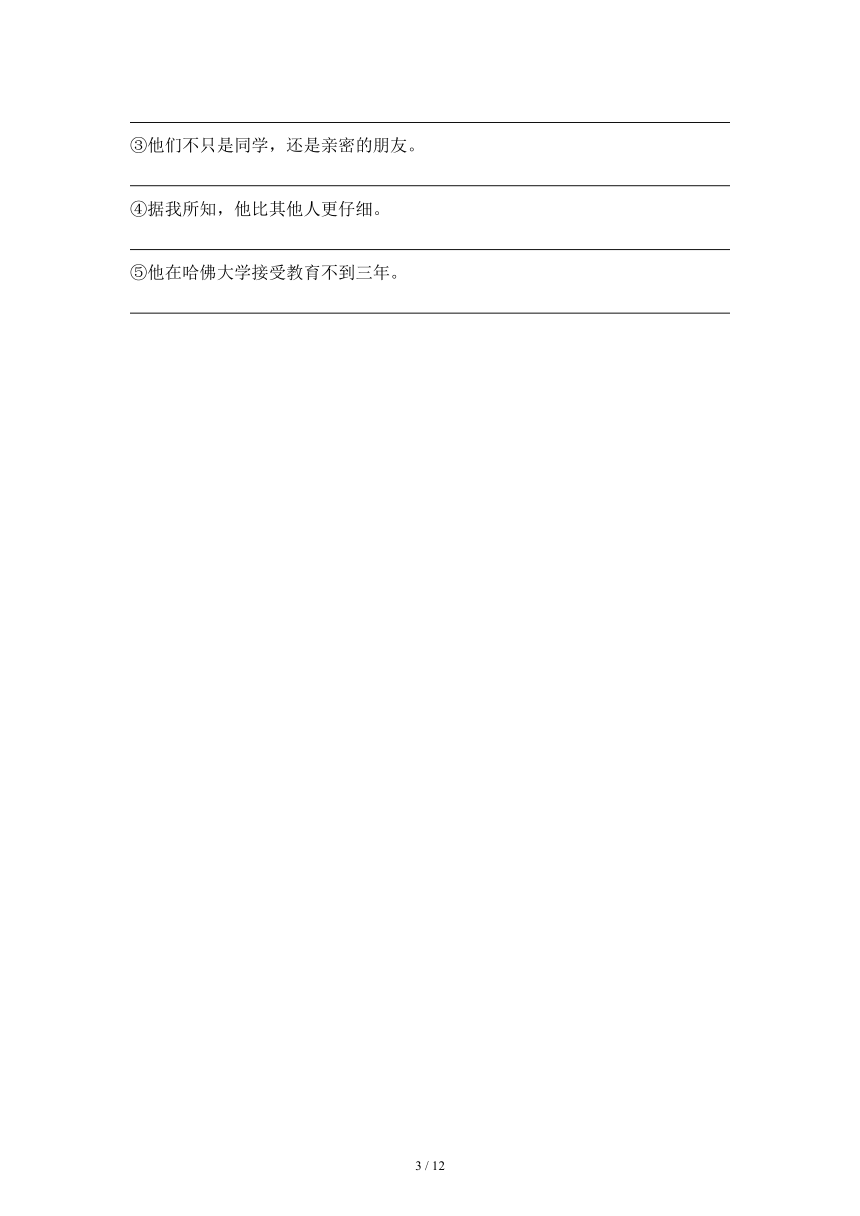
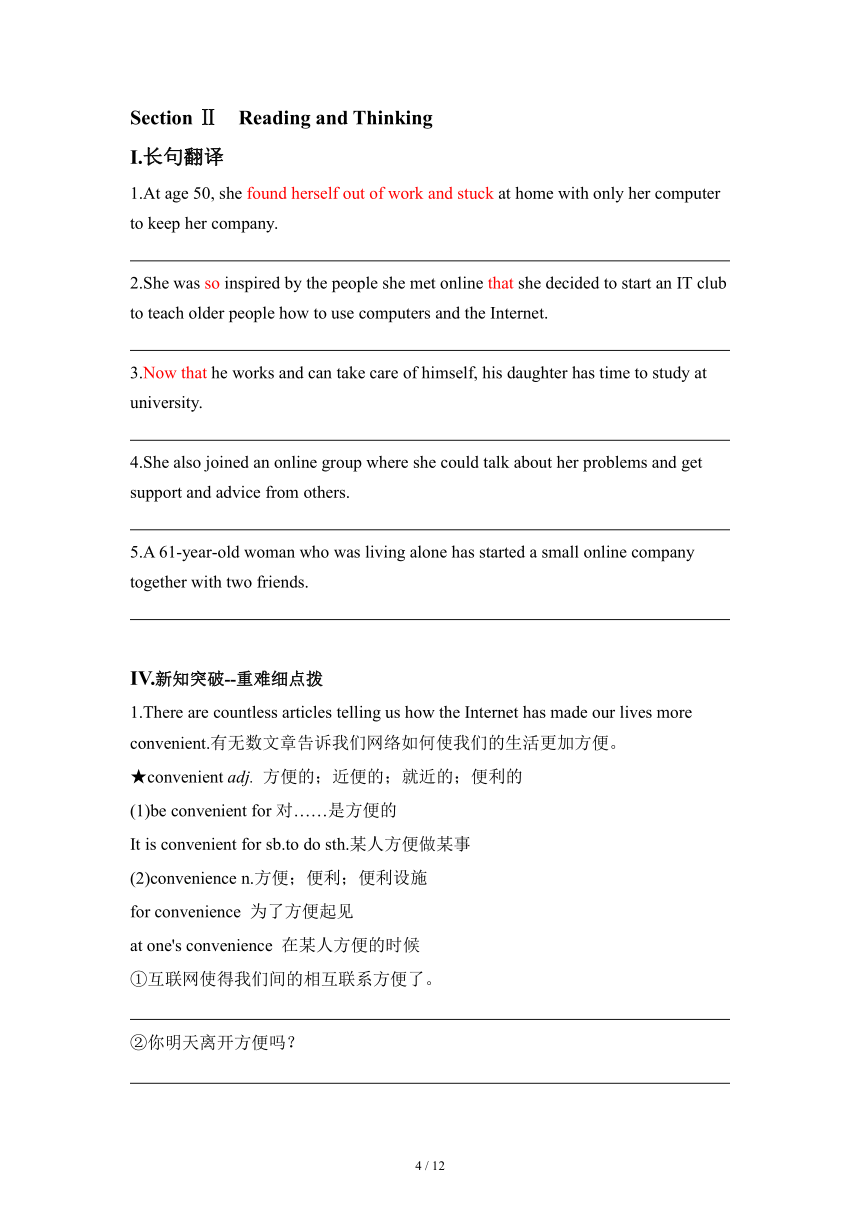
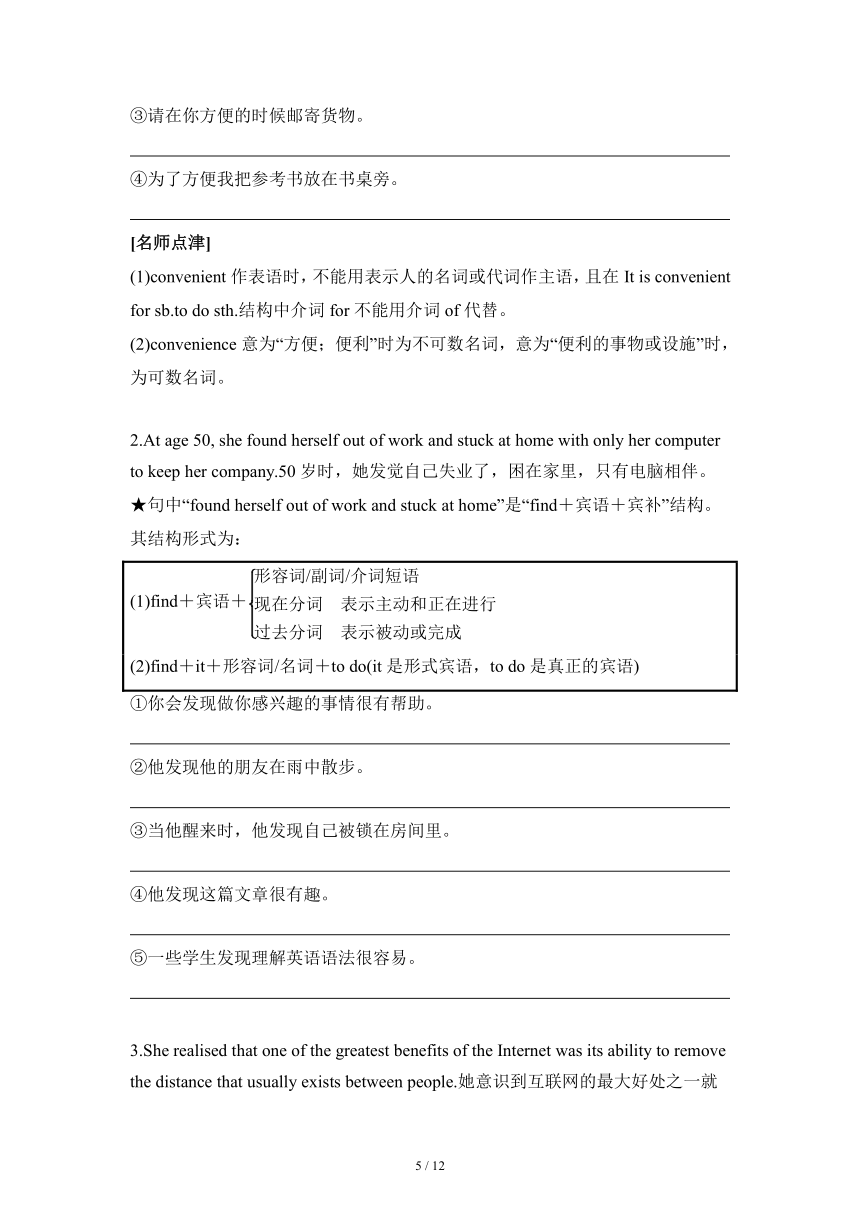
文档简介
英语 学科高中同步讲义(2019版)人教必修第二册
学生 年级 上课地点 第 次授课
授课时间 年 月 日 星期 学科老师 班主任
教学课题 高中同步词汇Unit 03
教学目标 掌握重点词汇及强化练习
教学重、难点 重点词汇的运用;强化阅读完型
教学内容
Section Ⅰ--Listening and Speaking
I.阅读积累
Online shopping has become very convenient① in recent years.Most big name companies have websites offering information② on their products and online stores allowing shoppers to purchase③ them in the comfort of their homes.
The first things that became wide spread online were computer equipment④ and accessories. It is still very prominent today, but we can find much more on the Internet. Some flower shops accept orders for flowers and gifts to be sent to anywhere around the globe⑤. Pizza is delivered⑥ by ordering on their web sites. Travelers can easily search for the cheapest airplane tickets, car rentals, and vacation packages.
Almost every type of consumer products⑦ can be ordered online. Office supplies, electronics, appliances, clothes, books, furniture⑧, and jewelry are not everything there is. Factor in the auction sites like eBay, every average computer user can buy and sell virtually anything; even automotive parts from junkyards.
The advantages of shopping online include cheaper prices,fast searching and comparing between manufacturers⑨ and products,and no time limits. On the other hand,security might fail and lead to credit card frauds; useless ads in our email accounts become a part of life; and atrophy (身体机能) takes over because we are all sitting down.
II.核心词汇集释
1.When you hear a word you don't know, pay attention to the next sentence or two to see if there is a definition.当你听到一个你不认识的单词时,注意下一句或两句看看是否有一个定义。
★pay attention to注意;留心;重视
pay much attention to非常注意
pay more attention to 更加关注
pay little/no attention to 很少/不注意
①我们应该注意保护濒临灭绝的动物。
②她总是很少注意自己的身体健康。
③人们对保护环境已投入了很多关注。
④她尽力注意老师在说什么。
[名师点津]
以上短语中的to都是介词,后跟名词、代词或动名词。
2.Sometimes I spend more than four hours online.有时我上网超过四个小时。
★more than超过;多于
(1)more ...than ...与其说……倒不如说……;比……多;比……更……
(2)more than+n.意为“不只是;不仅仅……”
(3)no more than仅仅(相当于only)
not more than不多于;不超过;至多
less than少于;不超过
①他们相爱已经5年多了。
②当她儿子再次撒谎时,与其说她生气倒不如说她伤心。
③他们不只是同学,还是亲密的朋友。
④据我所知,他比其他人更仔细。
⑤他在哈佛大学接受教育不到三年。
Section Ⅱ Reading and Thinking
I.长句翻译
1.At age 50, she found herself out of work and stuck at home with only her computer to keep her company.
2.She was so inspired by the people she met online that she decided to start an IT club to teach older people how to use computers and the Internet.
3.Now that he works and can take care of himself, his daughter has time to study at university.
4.She also joined an online group where she could talk about her problems and get support and advice from others.
5.A 61 year old woman who was living alone has started a small online company together with two friends.
IV.新知突破--重难细点拨
1.There are countless articles telling us how the Internet has made our lives more convenient.有无数文章告诉我们网络如何使我们的生活更加方便。
★convenient adj. 方便的;近便的;就近的;便利的
(1)be convenient for对……是方便的
It is convenient for sb.to do sth.某人方便做某事
(2)convenience n.方便;便利;便利设施
for convenience 为了方便起见
at one's convenience 在某人方便的时候
①互联网使得我们间的相互联系方便了。
②你明天离开方便吗?
③请在你方便的时候邮寄货物。
④为了方便我把参考书放在书桌旁。
[名师点津]
(1)convenient作表语时,不能用表示人的名词或代词作主语,且在It is convenient for sb.to do sth.结构中介词for不能用介词of代替。
(2)convenience意为“方便;便利”时为不可数名词,意为“便利的事物或设施”时,为可数名词。
2.At age 50, she found herself out of work and stuck at home with only her computer to keep her company.50岁时,她发觉自己失业了,困在家里,只有电脑相伴。
★句中“found herself out of work and stuck at home”是“find+宾语+宾补”结构。
其结构形式为:
(1)find+宾语+
(2)find+it+形容词/名词+to do(it是形式宾语,to do是真正的宾语)
①你会发现做你感兴趣的事情很有帮助。
②他发现他的朋友在雨中散步。
③当他醒来时,他发现自己被锁在房间里。
④他发现这篇文章很有趣。
⑤一些学生发现理解英语语法很容易。
3.She realised that one of the greatest benefits of the Internet was its ability to remove the distance that usually exists between people.她意识到互联网的最大好处之一就是能够消除通常存在于人和人之间的距离感。
★benefit n.益处;利益 vt.使受益vi.得益于
(1)for the benefit of = for one's benefit为了……的利益
be of benefit to有益于;对……有好处
have the benefit of 得益于
(2)benefit sb./sth.使某人或某物受益
benefit from/by ...从……中受益/获益
(3)beneficial adj.有利的;有益的;受益的
be beneficial to (= be of benefit to)对……有益;对……有利
①众所周知,书是知识的源泉。我从读书中获益匪浅。
②每天做运动对健康很有好处。
③这名士兵为了祖国的利益献出了生命。
④医生认为这个改变会对她的健康有益。
[语境串记]
It is known to us all that doing eye exercises benefits our eyes, and that is to say, our eyes can benefit from doing eye exercises.
众所周知,做眼保健操对我们的眼睛有好处。也就是说,我们的眼睛会受益于做眼保健操。
[名师点津] benefit一般为不可数名词,但意为“具体的好处”时是可数名词,可用复数形式。
⑤修建这座桥为我们的经济带来很多好处。
★distance n.距离
in the distance在远处
within walking distance在步行可到达的地方;几步之遥
from a distance从远处
at a distance隔一段距离;在稍远处
at a distance of ...在……远处
keep sb.at a distance (=keep one's distance from sb.)与某人保持一段距离;对某人冷淡、疏远
⑥你家离学校有多远?
⑦站在远处的那个男孩很有写作天赋。
⑧人们从10英里之处就能看到这个古代遗址。
⑨她父亲劝她疏远那个家伙。
4.She was so inspired by the people she met online that she decided to start an IT club to teach older people how to use computers and the Internet.她受到网友的启发,决定成立一个IT俱乐部来教年长一些的人们学习如何使用电脑和互联网。
★inspire vt.鼓舞;激励;启发思考
(1)inspire sb. to do sth. 激励某人做某事
激起/引起某人……
be inspired by 受到……的启发;由……得到灵感
(2)inspiring adj. 鼓舞人心的
inspired adj. 受到鼓舞的;有灵感的
(3)inspiration n. 灵感;鼓舞
①他鼓舞人心的评论激起了我的信心。
②17岁的姚悦激发了很多年轻人对计算机科学的兴趣。
③一位受这一情景启发的艺术家画下了这幅美丽的画。
④我们在日常生活中遇到的小问题可能是伟大发明的灵感来源。
★so ...that ...如此……以至于……;在句中引导结果状语从句。
⑤我的母亲如此固执以至于我从来不能说服她让步。
⑥这部电影如此好,以至于我想再看一遍。
⑦我们的时间那么少,以至于我们不能按时完成这项工作。
⑧天气这么糟,我们不得不待在家里。
5.Now that he works and can take care of himself, his daughter has time to study at university.由于他工作了并能照顾自己了,他的女儿有时间在大学学习了。
★now that既然;由于
now that在意思和用法上同since,引导原因状语从句,口语中that可省略。
①既然大家都到齐了,我们就开始开会吧。
②既然你已经长大了,就不应该依靠你的父母了。
[联想发散]
(1)引导原因状语从句的连词还有:since, because, as, considering (that), in that等。
(2)引导原因状语的短语:due to, thanks to, because of, as a result of, owing to, on account of等。
③我很幸运,因为我从来不必为钱发愁。
6.She believes that it is highly important to bridge the digital divide and make sure that everyone has access to the Internet and knows how to use new technology.她认为,消除数字鸿沟、确保每人都能使用互联网并且知晓如何运用新技术,是非常重要的。
★access n.通道;(使用、查阅、接近或面见的)机会vt.进入;使用;获取
①她偏爱城市生活的一个原因就是她可以很容易地进出像商场和饭店这样的地方。
②应该让老师和学生都能使用电脑。
③真令人恼火,我不能使用你推荐的数据库。
[名师点津] access前通常不加冠词,且access和accessible短语中的to是介词。
7.“When you go through tough times, you meet others who are facing similar challenges,”Jan says.
简说:“当你经历艰难的日子时,你会遇到面临同样挑战的人。”
★go through经历;度过;通读;经受;完成;仔细检查;(法案等)通过;花完;用掉
(1)写出下列句中go through的含义
①He went through many difficulties before he succeeded.
②You must go through your papers before you hand them in.
③The plan went through, which made us all happy.
④We went through all our money last week and had nothing to buy the computer.
(2)完成句子
⑤我对英语曾经一度不感兴趣,并且经历了几次失败。
Section Ⅲ Discovering Useful Structures --现在完成时的被动语态
一、结构
肯定式
主语+have/has been done ...
否定式
主语+have/has not been done ...
一般疑问式
Have/Has+主语+been done ...?
特殊疑问式
特殊疑问词+have/has+主语+been done ...?
1.野生动物在现代受到了极大的威胁。
2.这座桥的建设还没有完成。
3.下次会议的日期已决定了吗?
4.电池多久没有更换了?
[即时训练1]
(1)变换句子
The children have already been told the good news.
①将原句变为否定句。
②将原句变为一般疑问句。
③对原句中的the children进行提问。
(2)补全句子
④I'm sorry, but the letters yet.很抱歉,但是这些信件还没有被打印出来。
⑤The plan for nearly two hours.这项计划已被讨论了近两个小时了。
⑥She since then.从那时候起,她就没被提起。
二、用法
1.现在完成时的被动语态同它的主动语态一样,强调过去的动作对现在造成的影响或结果,通常与already, yet, just, never, recently等副词连用。
The machine has already been repaired.机器已经修好了。
2.表示一个被动的动作或状态开始于过去,持续到现在,并可能持续下去,常与for或since引导的时间状语连用,或用于“How long ...?”句型中。
Financial problems of the company have been discussed for nearly two hours.公司的财务问题已被讨论了近两个小时了。
How long has this film been shown 这部电影已放映多长时间了?
3.用在时间或条件状语从句中,表示将来某时已完成的动作,即用现在完成时的被动语态代替将来完成时的被动语态。
You shouldn't leave school before your homework has been finished.在你的作业没完成之前你不应该离开学校。
[联想发散] 常与现在完成时连用的时间状语:
already 已经 yet 已经
recently/lately 最近 since then 从那时起
ever since 自那以来 ever 曾经
so far 迄今为止 for a long time 很长一段时间
by now 到现在为止 in recent years 在最近几年里
in/during/over the past/last years 在过去的几年里
[即时训练2]
(1)用现在完成时的被动语态改写句子
①Jack's boss has always praised him for his devotion to work.
→Jack _____________________ by his boss for his devotion to work.
②They have found a good place to build a temple in the village.
→A good place _____________ to build a temple in the village.
③We haven't decided how to solve that difficult technological problem yet.
→How to solve that difficult technological problem __________________ yet.
(2)补全句子
④I will go home when my homework ________________.当我的家庭作业完成时我就回家。
⑤Paper money _____________________________________.纸币已被使用了1 000多年了。
三、注意事项
1.只带有一个宾语的动词变为被动语态时,将主动语态的宾语变为被动语态的主语。
His boss has already punished him.
→He has already been punished (by his boss).
[即时训练3] 将下面句子变为被动语态
①I have asked her to help you.
→_____________________________
②We have planted many trees on the hill in the last 5 years.
→______________________________________________ ______
2.带有双宾语的动词,如give, send, bring, take, teach, show, tell, make, sing, write, read, sell, buy, pay, lend, pass, promise等,变为被动语态时,一般将间接宾语变为被动语态的主语,若将直接宾语变为被动语态的主语时,间接宾语前面要用相应的介词。
The company has given him a chance to work abroad recently.
→He has been given a chance to work abroad recently (by the company).
→A chance to work abroad has been given to him recently (by the company).
[即时训练4] 将下面句子变为被动语态
He has sent me an e mail.
→_______________________
→
学生 年级 上课地点 第 次授课
授课时间 年 月 日 星期 学科老师 班主任
教学课题 高中同步词汇Unit 03
教学目标 掌握重点词汇及强化练习
教学重、难点 重点词汇的运用;强化阅读完型
教学内容
Section Ⅰ--Listening and Speaking
I.阅读积累
Online shopping has become very convenient① in recent years.Most big name companies have websites offering information② on their products and online stores allowing shoppers to purchase③ them in the comfort of their homes.
The first things that became wide spread online were computer equipment④ and accessories. It is still very prominent today, but we can find much more on the Internet. Some flower shops accept orders for flowers and gifts to be sent to anywhere around the globe⑤. Pizza is delivered⑥ by ordering on their web sites. Travelers can easily search for the cheapest airplane tickets, car rentals, and vacation packages.
Almost every type of consumer products⑦ can be ordered online. Office supplies, electronics, appliances, clothes, books, furniture⑧, and jewelry are not everything there is. Factor in the auction sites like eBay, every average computer user can buy and sell virtually anything; even automotive parts from junkyards.
The advantages of shopping online include cheaper prices,fast searching and comparing between manufacturers⑨ and products,and no time limits. On the other hand,security might fail and lead to credit card frauds; useless ads in our email accounts become a part of life; and atrophy (身体机能) takes over because we are all sitting down.
II.核心词汇集释
1.When you hear a word you don't know, pay attention to the next sentence or two to see if there is a definition.当你听到一个你不认识的单词时,注意下一句或两句看看是否有一个定义。
★pay attention to注意;留心;重视
pay much attention to非常注意
pay more attention to 更加关注
pay little/no attention to 很少/不注意
①我们应该注意保护濒临灭绝的动物。
②她总是很少注意自己的身体健康。
③人们对保护环境已投入了很多关注。
④她尽力注意老师在说什么。
[名师点津]
以上短语中的to都是介词,后跟名词、代词或动名词。
2.Sometimes I spend more than four hours online.有时我上网超过四个小时。
★more than超过;多于
(1)more ...than ...与其说……倒不如说……;比……多;比……更……
(2)more than+n.意为“不只是;不仅仅……”
(3)no more than仅仅(相当于only)
not more than不多于;不超过;至多
less than少于;不超过
①他们相爱已经5年多了。
②当她儿子再次撒谎时,与其说她生气倒不如说她伤心。
③他们不只是同学,还是亲密的朋友。
④据我所知,他比其他人更仔细。
⑤他在哈佛大学接受教育不到三年。
Section Ⅱ Reading and Thinking
I.长句翻译
1.At age 50, she found herself out of work and stuck at home with only her computer to keep her company.
2.She was so inspired by the people she met online that she decided to start an IT club to teach older people how to use computers and the Internet.
3.Now that he works and can take care of himself, his daughter has time to study at university.
4.She also joined an online group where she could talk about her problems and get support and advice from others.
5.A 61 year old woman who was living alone has started a small online company together with two friends.
IV.新知突破--重难细点拨
1.There are countless articles telling us how the Internet has made our lives more convenient.有无数文章告诉我们网络如何使我们的生活更加方便。
★convenient adj. 方便的;近便的;就近的;便利的
(1)be convenient for对……是方便的
It is convenient for sb.to do sth.某人方便做某事
(2)convenience n.方便;便利;便利设施
for convenience 为了方便起见
at one's convenience 在某人方便的时候
①互联网使得我们间的相互联系方便了。
②你明天离开方便吗?
③请在你方便的时候邮寄货物。
④为了方便我把参考书放在书桌旁。
[名师点津]
(1)convenient作表语时,不能用表示人的名词或代词作主语,且在It is convenient for sb.to do sth.结构中介词for不能用介词of代替。
(2)convenience意为“方便;便利”时为不可数名词,意为“便利的事物或设施”时,为可数名词。
2.At age 50, she found herself out of work and stuck at home with only her computer to keep her company.50岁时,她发觉自己失业了,困在家里,只有电脑相伴。
★句中“found herself out of work and stuck at home”是“find+宾语+宾补”结构。
其结构形式为:
(1)find+宾语+
(2)find+it+形容词/名词+to do(it是形式宾语,to do是真正的宾语)
①你会发现做你感兴趣的事情很有帮助。
②他发现他的朋友在雨中散步。
③当他醒来时,他发现自己被锁在房间里。
④他发现这篇文章很有趣。
⑤一些学生发现理解英语语法很容易。
3.She realised that one of the greatest benefits of the Internet was its ability to remove the distance that usually exists between people.她意识到互联网的最大好处之一就是能够消除通常存在于人和人之间的距离感。
★benefit n.益处;利益 vt.使受益vi.得益于
(1)for the benefit of = for one's benefit为了……的利益
be of benefit to有益于;对……有好处
have the benefit of 得益于
(2)benefit sb./sth.使某人或某物受益
benefit from/by ...从……中受益/获益
(3)beneficial adj.有利的;有益的;受益的
be beneficial to (= be of benefit to)对……有益;对……有利
①众所周知,书是知识的源泉。我从读书中获益匪浅。
②每天做运动对健康很有好处。
③这名士兵为了祖国的利益献出了生命。
④医生认为这个改变会对她的健康有益。
[语境串记]
It is known to us all that doing eye exercises benefits our eyes, and that is to say, our eyes can benefit from doing eye exercises.
众所周知,做眼保健操对我们的眼睛有好处。也就是说,我们的眼睛会受益于做眼保健操。
[名师点津] benefit一般为不可数名词,但意为“具体的好处”时是可数名词,可用复数形式。
⑤修建这座桥为我们的经济带来很多好处。
★distance n.距离
in the distance在远处
within walking distance在步行可到达的地方;几步之遥
from a distance从远处
at a distance隔一段距离;在稍远处
at a distance of ...在……远处
keep sb.at a distance (=keep one's distance from sb.)与某人保持一段距离;对某人冷淡、疏远
⑥你家离学校有多远?
⑦站在远处的那个男孩很有写作天赋。
⑧人们从10英里之处就能看到这个古代遗址。
⑨她父亲劝她疏远那个家伙。
4.She was so inspired by the people she met online that she decided to start an IT club to teach older people how to use computers and the Internet.她受到网友的启发,决定成立一个IT俱乐部来教年长一些的人们学习如何使用电脑和互联网。
★inspire vt.鼓舞;激励;启发思考
(1)inspire sb. to do sth. 激励某人做某事
激起/引起某人……
be inspired by 受到……的启发;由……得到灵感
(2)inspiring adj. 鼓舞人心的
inspired adj. 受到鼓舞的;有灵感的
(3)inspiration n. 灵感;鼓舞
①他鼓舞人心的评论激起了我的信心。
②17岁的姚悦激发了很多年轻人对计算机科学的兴趣。
③一位受这一情景启发的艺术家画下了这幅美丽的画。
④我们在日常生活中遇到的小问题可能是伟大发明的灵感来源。
★so ...that ...如此……以至于……;在句中引导结果状语从句。
⑤我的母亲如此固执以至于我从来不能说服她让步。
⑥这部电影如此好,以至于我想再看一遍。
⑦我们的时间那么少,以至于我们不能按时完成这项工作。
⑧天气这么糟,我们不得不待在家里。
5.Now that he works and can take care of himself, his daughter has time to study at university.由于他工作了并能照顾自己了,他的女儿有时间在大学学习了。
★now that既然;由于
now that在意思和用法上同since,引导原因状语从句,口语中that可省略。
①既然大家都到齐了,我们就开始开会吧。
②既然你已经长大了,就不应该依靠你的父母了。
[联想发散]
(1)引导原因状语从句的连词还有:since, because, as, considering (that), in that等。
(2)引导原因状语的短语:due to, thanks to, because of, as a result of, owing to, on account of等。
③我很幸运,因为我从来不必为钱发愁。
6.She believes that it is highly important to bridge the digital divide and make sure that everyone has access to the Internet and knows how to use new technology.她认为,消除数字鸿沟、确保每人都能使用互联网并且知晓如何运用新技术,是非常重要的。
★access n.通道;(使用、查阅、接近或面见的)机会vt.进入;使用;获取
①她偏爱城市生活的一个原因就是她可以很容易地进出像商场和饭店这样的地方。
②应该让老师和学生都能使用电脑。
③真令人恼火,我不能使用你推荐的数据库。
[名师点津] access前通常不加冠词,且access和accessible短语中的to是介词。
7.“When you go through tough times, you meet others who are facing similar challenges,”Jan says.
简说:“当你经历艰难的日子时,你会遇到面临同样挑战的人。”
★go through经历;度过;通读;经受;完成;仔细检查;(法案等)通过;花完;用掉
(1)写出下列句中go through的含义
①He went through many difficulties before he succeeded.
②You must go through your papers before you hand them in.
③The plan went through, which made us all happy.
④We went through all our money last week and had nothing to buy the computer.
(2)完成句子
⑤我对英语曾经一度不感兴趣,并且经历了几次失败。
Section Ⅲ Discovering Useful Structures --现在完成时的被动语态
一、结构
肯定式
主语+have/has been done ...
否定式
主语+have/has not been done ...
一般疑问式
Have/Has+主语+been done ...?
特殊疑问式
特殊疑问词+have/has+主语+been done ...?
1.野生动物在现代受到了极大的威胁。
2.这座桥的建设还没有完成。
3.下次会议的日期已决定了吗?
4.电池多久没有更换了?
[即时训练1]
(1)变换句子
The children have already been told the good news.
①将原句变为否定句。
②将原句变为一般疑问句。
③对原句中的the children进行提问。
(2)补全句子
④I'm sorry, but the letters yet.很抱歉,但是这些信件还没有被打印出来。
⑤The plan for nearly two hours.这项计划已被讨论了近两个小时了。
⑥She since then.从那时候起,她就没被提起。
二、用法
1.现在完成时的被动语态同它的主动语态一样,强调过去的动作对现在造成的影响或结果,通常与already, yet, just, never, recently等副词连用。
The machine has already been repaired.机器已经修好了。
2.表示一个被动的动作或状态开始于过去,持续到现在,并可能持续下去,常与for或since引导的时间状语连用,或用于“How long ...?”句型中。
Financial problems of the company have been discussed for nearly two hours.公司的财务问题已被讨论了近两个小时了。
How long has this film been shown 这部电影已放映多长时间了?
3.用在时间或条件状语从句中,表示将来某时已完成的动作,即用现在完成时的被动语态代替将来完成时的被动语态。
You shouldn't leave school before your homework has been finished.在你的作业没完成之前你不应该离开学校。
[联想发散] 常与现在完成时连用的时间状语:
already 已经 yet 已经
recently/lately 最近 since then 从那时起
ever since 自那以来 ever 曾经
so far 迄今为止 for a long time 很长一段时间
by now 到现在为止 in recent years 在最近几年里
in/during/over the past/last years 在过去的几年里
[即时训练2]
(1)用现在完成时的被动语态改写句子
①Jack's boss has always praised him for his devotion to work.
→Jack _____________________ by his boss for his devotion to work.
②They have found a good place to build a temple in the village.
→A good place _____________ to build a temple in the village.
③We haven't decided how to solve that difficult technological problem yet.
→How to solve that difficult technological problem __________________ yet.
(2)补全句子
④I will go home when my homework ________________.当我的家庭作业完成时我就回家。
⑤Paper money _____________________________________.纸币已被使用了1 000多年了。
三、注意事项
1.只带有一个宾语的动词变为被动语态时,将主动语态的宾语变为被动语态的主语。
His boss has already punished him.
→He has already been punished (by his boss).
[即时训练3] 将下面句子变为被动语态
①I have asked her to help you.
→_____________________________
②We have planted many trees on the hill in the last 5 years.
→______________________________________________ ______
2.带有双宾语的动词,如give, send, bring, take, teach, show, tell, make, sing, write, read, sell, buy, pay, lend, pass, promise等,变为被动语态时,一般将间接宾语变为被动语态的主语,若将直接宾语变为被动语态的主语时,间接宾语前面要用相应的介词。
The company has given him a chance to work abroad recently.
→He has been given a chance to work abroad recently (by the company).
→A chance to work abroad has been given to him recently (by the company).
[即时训练4] 将下面句子变为被动语态
He has sent me an e mail.
→_______________________
→
